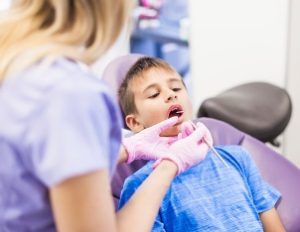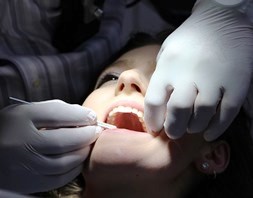Dental Hygiene Training Programs
How to Enroll In the Right One Near Twin Falls Idaho
 A critical first step to begin your new vocation in preventive dentistry is to choose the ideal dental hygienist school near Twin Falls ID. But before you can make your selection, you need to assess and compare your school options. Choosing the training with the lowest tuition or enrolling in the school that is closest to your home is not the right way to make your decision. A dentistry program's accreditation and reputation are also important issues and should be taken into account as well. Dental hygienists typically earn an Associate Degree, as compared to a certificate usually earned by assistants, and can take anywhere from two to three years to accomplish. Naturally with the lengthier training of a hygienist comes more expense. We will cover all of these factors and supplemental questions that you need to be asking the dental hygienist schools you are assessing later in this article. But first, let's look at the duties of dental hygienists and the training programs offered.
A critical first step to begin your new vocation in preventive dentistry is to choose the ideal dental hygienist school near Twin Falls ID. But before you can make your selection, you need to assess and compare your school options. Choosing the training with the lowest tuition or enrolling in the school that is closest to your home is not the right way to make your decision. A dentistry program's accreditation and reputation are also important issues and should be taken into account as well. Dental hygienists typically earn an Associate Degree, as compared to a certificate usually earned by assistants, and can take anywhere from two to three years to accomplish. Naturally with the lengthier training of a hygienist comes more expense. We will cover all of these factors and supplemental questions that you need to be asking the dental hygienist schools you are assessing later in this article. But first, let's look at the duties of dental hygienists and the training programs offered.
It Takes Just a Few Minutes to Start Your Dental Hygienist Career Below
Dental Hygienist Job Duties

When comparing the role of a dental hygienist to that of an assistant, the most significant difference is probably that the hygienist works more independently. Dental assistants work with and in support of the Twin Falls ID practice and the dentists. Hygienists, while also supporting the practice, work with the patients more on a one-to-one basis. They are usually the initial person a patient encounters when called from the waiting room. They examine every patient's teeth and gums and present their findings to the dentists. They may also perform basic procedures. Based on state law, a hygienist's duties may include:
- Removing plaque, tartar and stains
- Applying fluoride treatments
- Polishing teeth and applying sealants
- Educating patients about oral hygiene
- Taking X-rays and developing film
- Applying fillings and removing sutures
Dental Hygienist Degree Options
Due to the added responsibility in contrast to an assistant, dental hygienists employed in Twin Falls ID dental practices are often required to hold an Associate Degree in dental hygiene rather than a certificate. These programs can require anywhere from 2 to as long as 3 years to finish and must be accredited by the CDA in virtually every state. They are offered in trade and technical schools as well as community colleges. And in addition to classroom studies learning the fundamentals of dental hygiene, there will be a clinical component to the training as well. Many programs also sponsor internships with local dentists or dental practices.Online Dental Hygienist Training Programs
 Choosing an online dental hygienist program might be a good alternative for receiving your education. Just remember that the program will not be totally online, since there will be a clinical portion to your training. But the remainder of your classes will be accessible by means of your personal computer in the comfort of your Twin Falls ID home or elsewhere on your tablet or laptop. For those continuing to work while attending college, online dental classes make education much more accessible. Some may even offer lower tuition fees than their on-campus competitors. And added expenses for items like commuting, books and school supplies may be lessened also. The practical training can usually be completed at an area dental office or in an on-campus lab. With both the clinical and online training, everything necessary to obtain the proper education is provided. If you have the discipline for this style of learning, you might find that attending an online dental hygienist college is the best option for you.
Choosing an online dental hygienist program might be a good alternative for receiving your education. Just remember that the program will not be totally online, since there will be a clinical portion to your training. But the remainder of your classes will be accessible by means of your personal computer in the comfort of your Twin Falls ID home or elsewhere on your tablet or laptop. For those continuing to work while attending college, online dental classes make education much more accessible. Some may even offer lower tuition fees than their on-campus competitors. And added expenses for items like commuting, books and school supplies may be lessened also. The practical training can usually be completed at an area dental office or in an on-campus lab. With both the clinical and online training, everything necessary to obtain the proper education is provided. If you have the discipline for this style of learning, you might find that attending an online dental hygienist college is the best option for you.
Subjects to Cover With Dental Hygienist Programs
Now that you have decided to become a dental hygienist in Twin Falls ID, you can begin the procedure of comparing programs and schools. As we covered at the start of this article, many students begin by looking at the location and the cost of the schools. Maybe they search for several online options also. Although these are relevant initial considerations, there are a few additional questions that you need to address to the programs you are looking at in order to reach an informed decision. To start that process, we have included a list of questions to assist you with your due diligence and ultimate selection of the right dental hygienist school for you.
Is the Dental College Accredited? There are a number of good reasons why you should only choose an accredited dental hygienist college. If you are intending to become licensed or certified, then accreditation is a condition in nearly all states. To qualify to take the National Board Dental Hygiene Exam, your dental program must be accredited by the Commission on Dental Accreditation (CDA). Accreditation also helps ensure that the instruction you get is comprehensive and of the highest quality. Twin Falls ID employers typically desire or require that new hires are graduates of accredited colleges. And last, if you are applying for a student loan or financial aid, often they are not obtainable for non-accredited colleges.
Is Adequate Clinical Training Included? Clinical or practical training is an important component of every dental training program. This applies for the online college options also. Most dental hygienist schools have associations with regional dental practices and clinics that provide clinical training for their students. It's not only important that the school you select offers sufficient clinical hours but also provides them in the kind of practice that you ultimately want to work in. As an example, if you are interested in a career in pediatric dentistry, check that the school you enroll in offers clinical rotation in a local Twin Falls ID dental office that specializes in dental care for children.
Is There an Internship Program? Find out if the dental schools you are exploring have an internship program. Internships are probably the best means to obtain hands-on, practical experience in a professional dental practice. They help students to transition from the theoretical to the practical. They can also help students build working relationships in the professional dental community. And they are attractive on resumes as well.
Is Job Placement Support Provided? Most graduating students of dental hygienist colleges require help obtaining their first job. Find out if the schools you are looking at have job placement programs, and what their job placement rates are. Schools with higher job placement rates are likely to have good reputations within the Twin Falls ID dental community as well as broad networks of contacts where they can refer their students for internships or employment.
Are the Classrooms Smaller? Check with the schools you are evaluating how large typically their classes are. The smaller classes generally provide a more intimate environment for learning where students have greater access to the instructors. On the other hand, large classes often are impersonal and offer little individualized instruction. If practical, find out if you can sit in on a few classes at the Twin Falls ID dental hygienist college that you are leaning toward in order to witness first hand the amount of interaction between teachers and students before enrolling.
What is the Entire Cost of the Program? Dental hygiene colleges can fluctuate in cost dependent on the duration of the program and the amount of practical training provided. Other factors, for example the reputations of the colleges and if they are private or public also have an impact. But in addition to the tuition there are other substantial costs which can add up. They can include expenses for such things as commuting and textbooks as well as school materials, equipment and supplies. So when examining the cost of programs, remember to include all of the expenses associated with your education. Most colleges have financial aid departments, so make sure to ask what is available as far as loans, grants and scholarships in the Twin Falls ID area.
Are the Classes Accessible? Before enrolling in a dental hygienist school, you must make sure that the hygienist or assistant program provides classes that accommodate your schedule. This is particularly true if you will be working while receiving your education and need to go to classes near Twin Falls ID at nights or on weekends. And even if you select an online school, you will still have to schedule your practical training classes. Also, while addressing your concerns, ask what the make-up practice is if you should need to miss any classes due to work, illness or family emergencies.
Find Out More About Becoming a Dental Hygienist in Twin Falls
Pick the Best Twin Falls Dental Hygienist Program
Enrolling in the ideal dental hygienist program is crucial if you want to take the National Board Dental Hygiene examination or, if required in your state, become licensed. As we have covered, there are several options available to receive your training and it takes a fairly short period of time to become a dental hygienist. You can obtain your formal training through dental hygienist programs at community colleges, vocational schools, technical institutes and trade schools. Graduates of these schools normally earn an Associate Degree. Dental Hygienists generally require roughly 2 years of studies prior to entering the work force. When pursuing a degree you can elect to attend classes online or on-campus. Whichever mode of training you elect to pursue, by asking the questions provided in this article you will be in a better position to make the ideal choice. And as a result, you will be ready to begin your journey toward becoming a dental hygienist in Twin Falls Idaho.
Twin Falls Dental Hygienist Colleges | Twin Falls Dental Hygienist Schools Near Me
